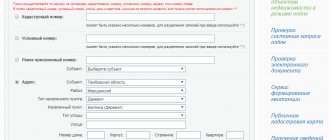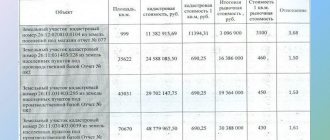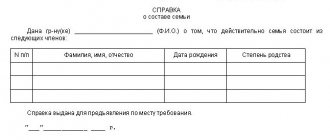Before the adoption of the Land Code of the Russian Federation in 2001, registration of land plots for personal subsidiary plots was carried out in the so-called household books. Today, such records are kept in the Unified State Register of Real Estate (hereinafter referred to as “USRN”) and nowhere else, but the extract from the household ledger is still in circulation. In this article we will examine the question: “Extract from the household register about the existence of the right to a land plot - where to get it and how much it costs in 2021.”
What is an extract from a household ledger?
Let's start by explaining what an extract from a household ledger is in principle. Before the start of privatization in our country, records of lands provided to citizens for running personal subsidiary plots were kept in household books. Such registers were maintained by local governments. De jure, no one has been keeping household books for a long time, since all real estate is recorded in the Unified State Register of Real Estate and nothing more. De facto, household books continue to exist, albeit as archival information.
However, due to the fact that the law does not have retroactive force, land provided to citizens for private household plots can still be registered precisely on the basis of an extract from that same household register. That is, if a plot for private plots was provided to a citizen before 2001, an extract from the household register will act as a title document on the basis of which cadastral registration and registration of ownership of such a land plot can be carried out. This is not just a position that needs to be justified, but a citizen’s right provided for in paragraphs. 3, paragraph 1, art. 49 of the Federal Law of July 13, 2015 N 218-FZ “On State Registration of Real Estate”.
When it's needed
The information contained in the household record book is undoubtedly significant and is requested in the following situations :
- land privatization;
- when transferring land in the process of inheritance;
- acquisition of new land;
- reporting information about the site to the cadastral service.
It is worth emphasizing that until the spring of 2021, consent to put the site into use is temporarily not required by the state; only information about the ownership of the land is required for registration. An important change for landowners was the transfer of information from household records to cadastral archives.
The state pursues two goals by simplifying land legislation :
- assigning land to direct owners to increase the efficiency of its use;
- budget increase due to land taxation.
The following persons can request an extract :
- citizens for subjective reasons;
- authorized persons of organizations;
- government agencies to verify the fact of use of a plot of land.
Where to get and how much does it cost to get an extract from the household ledger?
Where can I get an extract from the household ledger and how much does it cost? Since household books were kept by local authorities (local administration), accordingly, they must be received there. To do this, you need to contact the administration with a written application to issue you, as the owner of the plot, an extract from the household register, i.e. actually a document of title to the land. However, this is not the only opportunity to obtain an extract from the household ledger.
Today, an extract from the household register can be obtained at the territorial branch of the MFC or, for greater convenience, you can order it without leaving your home through a single portal of State Services. The deadline for providing an extract from the household ledger, regardless of the method of filing the application, is up to 30 days . This service is provided free of charge, i.e. for free .
Moreover, you can choose the method of receiving an extract from the household ledger at your discretion: either receive it in person, or by mail, or electronically through your personal State Services account. However, we recommend that you clarify the specifics of providing an extract from the household register in your region from the authorized bodies. Conditions may differ from those stated in this article as they are subject to local regulations.
Who is eligible to receive
In general, a request for an extract can be made by:
- citizens on personal matters;
- representatives of organizations;
- government authorities to confirm the facts of land use.
Important innovations: currently, an extract about the previous owner can be obtained by the current owner or a person claiming ownership of the property.
Representatives of legal entities can also make a request by presenting a power of attorney.
When citizens apply, interested parties include notaries, employees of registration chambers, and lawyers specializing in inheritance matters.
You can request a certificate from the household register from the nearest authorities in the area where the land plot is located.
It can be:
- rural administrations;
- village authorities;
- land property management committees;
- multifunctional centers;
- other structures.
Now the extract is provided in a new unified form from 2012 and contains the following mandatory details:
- Information about the owner, his address.
- Primary information that serves as the basis for inclusion in the book.
- Category of allotment, area, location address.
- Type of right to property.
- Last name, position of the person, name of the organization that issued the certificate.
An extract from the household register for the land plot is required for the municipal authority in whose archives it is stored. Therefore, when deciding the issue of restoration of property rights through the local administration, citizens have the right to appeal to information from a designated source.
Then, to the application for restoration of property rights, the applicant attaches a request for the issuance of an extract from the household register, on the basis of which he asks to restore ownership of the plot or building.
If such a request is not attached to the application, the authorized person responsible for determining the property rights of citizens has the right to request information from the household register. On the basis of these, the right of ownership is recognized, or a refusal is issued to citizens in the form of a reasoned extract from the administrative decision.
If an extract is required to conduct an arbitration dispute, it is requested by the plaintiff or defendant on the basis of a request issued by the court. Arbitrary receipt of the indicated information from third parties is not permitted. When requesting an extract you must:
- presence of motivating reasons;
- submitting an application to the administration;
- request from the court.
In this case, the document is issued only to the owner of the property or the copyright holder restoring his own property rights. And also - an attorney acting in the interests of the property owner on the basis of a notarized power of attorney.
Extract from the household register for a land plot: form form
The purposeful purpose of the designated records as title-establishing types of documentation is not defined by the nomenclature. But household information is turned to precisely for this purpose.
They restore and compensate for the lack or absence of title documentation for real estate.
Moreover, the records act as the only and indisputable argument about the ownership of a particular property by a person.
Most often, on their basis, the ownership of land or plots is established.
If the information were of a legal nature, it would be sufficient to create the right to own and dispose of a site or building. Among other things, extracts and certificates would be sufficient for registration with Rosreestr.
Since this is not acceptable, the information received is only the basis for obtaining title documentation. Rather, they refer to the type of conclusive evidence that is used as evidence of ownership of real estate.
According to the regulations, after receiving a household statement, the interested person applies to the head of the executive committee with a new application. It expresses a request for the issuance of a title deed. The application is considered by the administrative commission. If the decision is positive, it issues a certificate of ownership of the property to the applicant.
This act becomes a sufficient basis for conducting cadastral registration of land and houses. If the administrative commission has provided a reasoned extract from the decision with a refusal, it can be challenged in court.
In this case, the statement of claim is filed with the district court at the location of the administration that refused to certify the right to own the property.
When making decisions, the courts are guided by the received household extracts.
On their basis, as well as upon presentation of other evidence of ownership of real estate, a court decision is issued. If the claim is recognized and the court’s decision is positive, it has the force of legal documentation.
On this basis, real estate is registered, and the plaintiff acquires recognition of the right to own the property.
and a ready-made form without registration
Since the provision of an extract from the household register is a municipal service, the application form for its receipt is also regulated by local regulations, which means that depending on the area, its type may be different.
You can download a sample form of such an application by following the link.
The form of the extract from the household register, on the contrary, was approved by order of the Federal Service for State Registration, Cadastre and Cartography dated 03/07/2012 No. P/103.
Extracts from the household ledger can be obtained by following the link.
Price
The state provides the service of issuing certificates free of charge. The state fee will be charged only when submitting an extract for registration of rights.
Due to the fact that the issue of issuing such information is left to the discretion of local authorities, the time frame for receiving the document is also set differently, but cannot be more than 30 calendar days.
If you have any disagreements with the authorities, you will have to resolve the issue by going to court.
Please note that all landowners are required to pay land tax.
Why is it necessary to register land using an extract from the household register?
Surprisingly, there are a great many cases of unregistered land since time immemorial (or, to be more precise, before the adoption of the Land Code of the Russian Federation). The next extension of the so-called “Dacha Amnesty” has somewhat relaxed citizens in the matter of registering their plots with the cadastral register and registering ownership of them, but in vain.
The simplified procedure for registering rights to land plots (in particular, based on an extract from the household register), provided for by Federal Law No. 267-FZ dated August 2, 2019 (extension of the “dacha amnesty”), expires on March 1, 2021.
It would seem that there was a time for “a carriage and a small cart,” but that was not the case: the procedure for legalizing real estate often drags on for many months, or even years. For every “piece of paper” you have to get ten more “pieces of paper”. It’s not for us to explain to you that bureaucracy in our country is an ineradicable concept and does not have the most pleasant flair.
The consequences of carelessness in this matter can be very unpleasant: real estate that is not registered in accordance with current legislation cannot be sold, rented, donated, etc. In other words, it is simply impossible to dispose of it at your own discretion.
In turn, we recommend that you do not delay the issue of registering real estate according to the letter of the law, since our state is extremely unpredictable and what awaits us next is unknown, so it is better to protect your property.
Step-by-step instructions for receiving
Information is obtained at the place where the book is stored, that is, at the location of the land plot in respect of which information is requested.
You should contact the administrative institution on whose territory the land plot is located, the secretary of the village administration or the land department of the city administration. The appeal occurs by submitting an application, which is addressed to the head of the local administration. The application must indicate the approximate date of origin of ownership. In the absence of this information, this fact is indicated. Then the authorized person has to expand the scope of the search.
If there are no household books for the specified period, the interested person receives a corresponding extract, with which it is sent to the archive.
The administration fulfills the order within 1 calendar month. The archive prepares an extract within no more than 5 working days.
There is no charge for the service provided by the administration. However, the applicant will have to pay 200 rubles of state duty. For an official document drawn up on the basis of an archival extract, a payment in the amount of 1,500 rubles is charged.
The received document is considered as the main confirmation of the property rights of the landowner, which has indisputable legal force to confirm the ownership of land, both in administrative and judicial proceedings.
Read even more useful information about memory categories in our section.
What information does it contain?
What can you learn from such a book?
Household books are not compiled for each household separately. They represent a single document about all farms in a certain village or other area.
When recording all private household plots located in a certain area, a separate record (personal account) is created for each of them.
They contain the following information:
- personal account number and farm address;
- information about all its members;
- area of land occupied by plantings and crops;
- its cadastral number;
- about the rights to the existing plot;
- on the number and composition of bred animals, birds, bees;
- about available agricultural equipment and machinery.
conclusions
Despite the fact that today there are various systems for recording land plots, business books remain valid.
For persons whose rights to land have not yet been formalized, they can act as confirmation of their existence. To submit information from such documents to registration or other authorities, you will need to obtain a corresponding extract.
When controversial issues arise, courts rightfully turn to it again and again, despite the inventory nature of this document. The book remains the only evidence for determining the true owners of land in times of absence of state accounting and control in the field of land relations.










